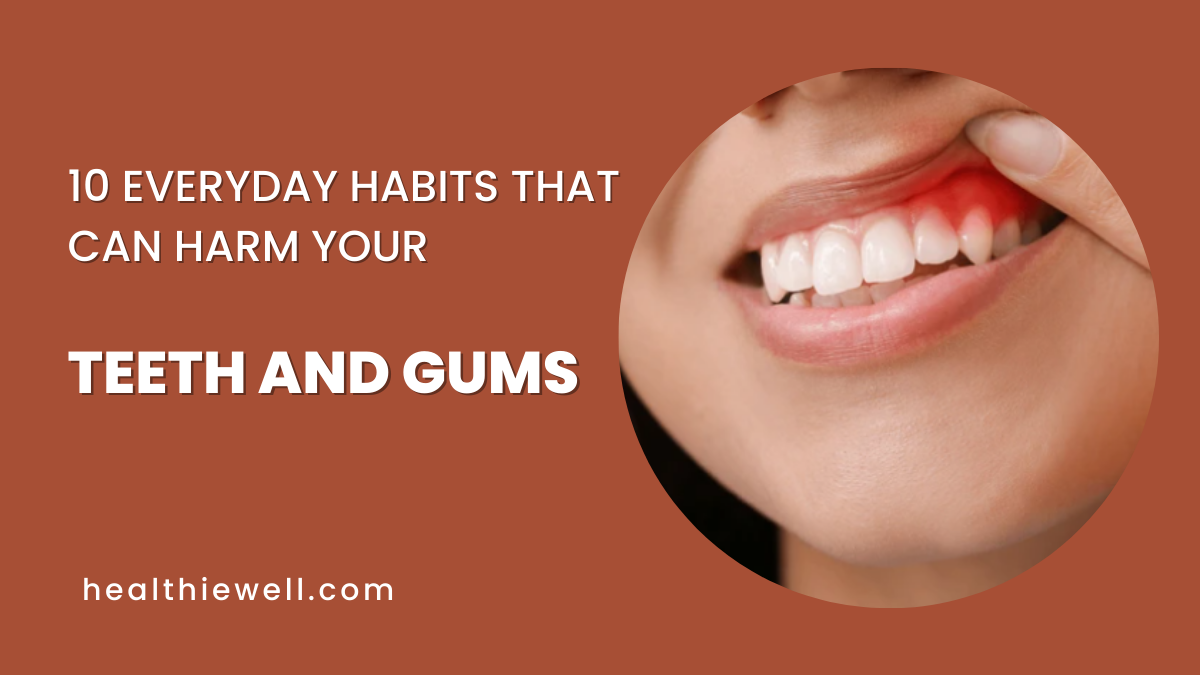Maintaining good oral hygiene is essential for a healthy smile, but many people unknowingly engage in daily habits that can harm their teeth and gums. From diet choices to personal care routines, certain practices can lead to tooth decay, gum disease, and other dental problems. Here are 10 everyday habits that might be damaging your oral health and how you can prevent them.
1. Brushing Too Hard
While brushing your teeth is crucial for good oral health, using too much force can do more harm than good. Brushing too hard can wear down the enamel, cause gum recession, and increase tooth sensitivity. To protect your teeth, use a soft-bristled toothbrush and apply gentle, circular motions instead of scrubbing aggressively.
2. Skipping Flossing
Many people underestimate the importance of flossing, thinking that brushing alone is enough. However, flossing helps remove plaque and food particles from between the teeth where a toothbrush cannot reach. Neglecting to floss can lead to cavities, gum disease, and bad breath. Make it a habit to floss daily to maintain optimal oral health.
3. Frequent Snacking on Sugary Foods
Consuming sugary snacks and beverages throughout the day increases the risk of cavities. Sugars interact with bacteria in the mouth to produce acid, which erodes tooth enamel. Instead of frequent snacking, try to limit sugar intake and opt for healthier choices like vegetables, cheese, or nuts to support strong teeth.
4. Using Your Teeth as Tools
Many people use their teeth to open bottle caps, tear packaging, or even bite nails. These habits put excessive pressure on your teeth and can cause chips, cracks, or fractures. Always use the proper tools for these tasks to prevent unnecessary damage to your teeth.
5. Drinking Too Much Coffee or Tea
Coffee and tea contain tannins that can stain teeth over time. Additionally, these beverages are often acidic, which can weaken enamel and make teeth more susceptible to decay. If you can’t avoid them, consider using a straw to reduce direct contact with your teeth and rinse your mouth with water afterward.
6. Smoking and Tobacco Use
Smoking and chewing tobacco are some of the most harmful habits for your oral health. They contribute to gum disease, tooth discoloration, bad breath, and an increased risk of oral cancer. Quitting tobacco products not only benefits your teeth and gums but also improves your overall health.
7. Ignoring Dry Mouth
Saliva is essential for neutralizing acids and washing away food particles. Dry mouth, often caused by dehydration, certain medications, or medical conditions, can increase the risk of cavities and gum disease. Stay hydrated by drinking plenty of water and chewing sugar-free gum to stimulate saliva production.
8. Grinding Your Teeth (Bruxism)
Many people grind or clench their teeth, often unconsciously during sleep. This habit can cause tooth wear, fractures, jaw pain, and headaches. If you suspect you grind your teeth, consider wearing a night guard and practicing stress-relief techniques to reduce the impact.
9. Drinking Carbonated and Acidic Beverages
Soda, sports drinks, and citrus juices contain high levels of acid that erode tooth enamel over time. Even diet sodas can be harmful due to their acidity. Instead, drink water or milk, which help strengthen teeth and neutralize acids in the mouth.
10. Skipping Regular Dental Checkups
Many people avoid visiting the dentist unless they experience pain or discomfort. However, regular dental checkups and cleanings help detect issues early and prevent serious problems. Aim to visit your dentist at least twice a year for professional cleanings and exams.
Conclusion
Your daily habits play a significant role in maintaining good oral health. By making small changes, such as using a soft-bristled toothbrush, limiting sugar intake, staying hydrated, and visiting the dentist regularly, you can protect your teeth and gums from potential harm. Pay attention to these habits and prioritize your oral hygiene to enjoy a healthy, confident smile for years to come.

